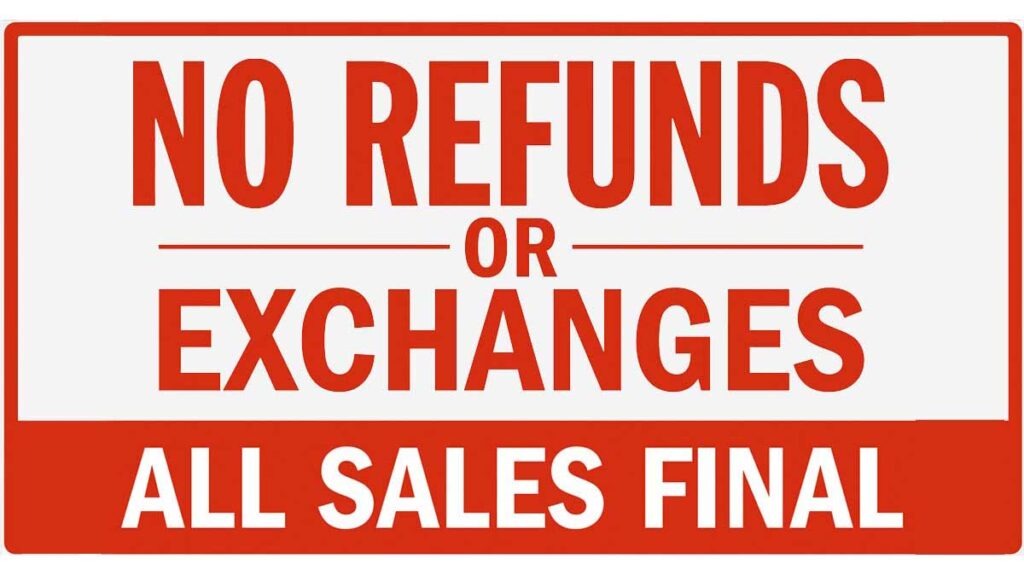So, you’ve received a gift that just isn’t quite what you were hoping for. We’ve all been there. The thought of returning it may seem daunting, as you don’t want to hurt the feelings of the person who gave it to you. But fear not, because in this article, we’ll share some helpful tips on how to gracefully return a gift without offending the giver. With a little tact and consideration, you’ll be able to navigate this situation with ease, ensuring both parties remain happy and understanding.
Consider the giver’s feelings
Put yourself in their shoes
When considering how to return a gift without offending the giver, it’s important to first put yourself in their shoes. Try to understand why they chose that particular gift and what their intentions were. Maybe they believed it was something you needed or would genuinely appreciate. By empathizing with the giver, you can approach the situation with more sensitivity and understanding.
Think about their intentions
While the gift might not have been what you were expecting or wanting, it’s important to consider the giver’s intentions. Remember that they took the time and effort to select a gift for you, and their intentions were likely rooted in love and thoughtfulness. Even if the gift missed the mark, try to appreciate the sentiment and the effort they put into choosing something for you.
Consider your relationship with the giver
Another factor to consider is the nature of your relationship with the giver. Are they a close family member or a dear friend? Or are they an acquaintance or colleague? Understanding the dynamics of your relationship can help guide your approach in returning the gift. Being more considerate with those who have a closer bond with you is essential, as their feelings may be more easily hurt.
Evaluate the gift
Appreciate the thought behind it
Before making any decision about returning a gift, take a moment to appreciate the thought that went into it. Consider the fact that the giver likely wanted to bring joy or show their affection for you. Even if the gift isn’t to your liking or doesn’t suit your taste, recognizing the thought behind it can help you approach the situation with gratitude and empathy.
Assess its usefulness
When evaluating a gift, it’s important to assess its usefulness to you. Ask yourself if the gift is something you can actually use or benefit from. If it’s something that will bring you joy or serve a purpose in your life, you may want to reconsider returning it. However, if the gift doesn’t align with your needs or interests, it may be worth considering a return.
Consider if it aligns with your values
While evaluating the gift, also consider if it aligns with your values. Does it reflect your personal preferences or beliefs? If the gift contradicts your values or goes against your lifestyle choices, it’s understandable that you might not want to keep it. It’s important to prioritize your own beliefs and comfort when deciding whether or not to return the gift.
Check the return policy
Review the store’s policy
Before proceeding with the return, it’s crucial to review the store’s return policy. Different stores have different policies and timeframes for returns. Familiarize yourself with their specific guidelines to ensure you meet all the requirements for a smooth return process. Some stores may only accept returns with a receipt or within a certain timeframe, so it’s important to be aware of these details.
Check if you have the receipt
Having the receipt can make the return process much easier. Check if you received a receipt with the gift or if you can obtain one from the giver. Having proof of purchase can simplify the return process as it helps the store verify the item was bought from their establishment. However, if you don’t have the receipt, don’t worry – there may still be options available to you.
Verify the deadline for returns
In addition to having the receipt, make sure to check the deadline for returns. Most stores have a specific timeframe within which you can return an item. Ensure that you initiate the return within this timeframe to avoid any complications. Returning the gift promptly shows respect for the store’s policies and helps facilitate a smoother return experience.
Prepare your explanation
Keep it honest yet tactful
When explaining your decision to return the gift, it’s important to be honest yet tactful. Avoid making up excuses or lying about your reasons. Instead, express your gratitude for the gift while gently explaining why it may not be suitable for you. For example, you could say something like, “I genuinely appreciate the thought behind your gift, but I recently realized that I already have a similar item that I frequently use.”
Highlight the positive aspects of the gift
While explaining your decision, remember to highlight the positive aspects of the gift. Focus on the thoughtfulness and effort that went into choosing the gift, rather than solely on your reasons for returning it. Emphasize your appreciation for the gesture and the fact that you value the giver’s generosity and thinking of you.
Avoid blaming or criticizing the giver
It’s important to approach the conversation with sensitivity and empathy, so avoid blaming or criticizing the giver. Instead of saying something negative about the gift or implying that they made a mistake, focus on your personal preferences or needs. By avoiding blame or criticism, you can maintain the giver’s dignity and foster a positive relationship.
Choose the appropriate time and place
Find a suitable moment
Choosing the right time to discuss the return is crucial. Ensure that you find a suitable moment when both you and the giver are relaxed and available for a conversation. Avoid bringing up the topic in stressful or busy situations, as it may not be the ideal time for a productive conversation. Select a moment when you can have a calm and focused discussion.
Consider privacy and comfort
In addition to timing, consider the location and environment in which you discuss the return. Choose a private and comfortable setting where both you and the giver can feel at ease. Having privacy can help facilitate open and honest communication without the fear of others overhearing or influencing the conversation. Aim for a relaxed atmosphere that promotes understanding and respect.
Avoid returning the gift in public
Returning the gift in a public setting should be avoided whenever possible. Doing so may embarrass the giver or put them on the spot. Instead, opt for a private conversation where both parties can express their thoughts and feelings without feeling judged or exposed. This allows for a more considerate exchange and reduces the risk of causing unnecessary discomfort for either party.
Express gratitude and appreciation
Acknowledge the giver’s thoughtfulness
When discussing the return, it’s crucial to acknowledge the giver’s thoughtfulness. Express your gratitude for their effort in selecting a gift for you. Let them know that you genuinely appreciate the time and consideration they put into choosing something they believed you would like. By acknowledging their thoughtfulness, you show that you value their intentions and the effort they made.
Thank them for the gesture
Along with expressing gratitude, remember to thank the giver for the gesture itself. Regardless of whether the gift was a perfect fit for you, the act of giving should be recognized and appreciated. Let the giver know that their gift was meaningful and that you are thankful for their kindness and generosity. A simple “thank you” can go a long way in maintaining a positive relationship.
Highlight aspects you truly liked about the gift
During the conversation, highlight aspects of the gift that you genuinely liked or enjoyed. Even if the gift overall may not be suitable for you, there might be specific features or qualities that you can genuinely appreciate. By focusing on the positive aspects, you demonstrate that you did derive some joy or satisfaction from the gift, even if it wasn’t the perfect fit. This can help mitigate any disappointment the giver may initially feel.
Be polite and respectful
Use gentle and respectful language
Throughout the entire process of returning the gift, it’s crucial to use gentle and respectful language. Choose your words carefully and opt for phrases that convey your message without offending or hurting the giver. Being polite and respectful in your language demonstrates your consideration for the giver’s feelings and helps maintain the positive tone of the conversation.
Avoid rude or confrontational behavior
No matter how you may feel about the gift, it’s essential to avoid rude or confrontational behavior. Be mindful of your tone of voice and body language during the conversation. Stay calm and composed, even if the discussion becomes a bit uncomfortable. Remember that you are trying to find a solution that respects both your feelings and the giver’s.
Show appreciation for the giver’s effort
Throughout the return process, consistently show appreciation for the giver’s effort. Even if you may not have been completely satisfied with the gift, the thought and effort they put into choosing it should still be valued and acknowledged. By expressing gratitude for their gesture, you convey your appreciation for the time and consideration they invested in selecting a gift for you.
Be prepared for possible reactions
Embrace understanding and acceptance
During the conversation about returning the gift, it’s important to be prepared for the giver’s reaction. Understand that they may feel disappointed or hurt initially, and it’s essential to embrace their emotions with empathy and understanding. Be open to listening and accepting their initial reaction, as it is a natural response to the situation.
Expect some initial disappointment or hurt
Returning a gift can occasionally cause feelings of disappointment or hurt, so be prepared for these emotions from the giver. Recognize that their intentions were likely loving and positive, and they may have had certain expectations about your reaction to the gift. However, by approaching the conversation with sensitivity and understanding, you can help alleviate any initial disappointment or hurt.
Be ready to provide reassurance
In response to the giver’s disappointment or hurt, be ready to provide reassurance. Remind them that your decision to return the gift is not a reflection of your love or appreciation for them. Assure them that your relationship remains strong and that you value them deeply. Reassure them that the return is solely about personal preferences or practicality, and it does not diminish the love and connection you share.
Offer alternatives
Suggest an exchange or store credit
If you feel comfortable doing so, consider suggesting an exchange or store credit as an alternative solution. This allows the giver to understand that their gift didn’t quite meet your needs or preferences while still giving them the opportunity to contribute to something you truly desire. Offering an alternative shows that you value their input and are open to finding a solution that benefits both parties.
Propose giving the gift to someone else
Another alternative is to propose giving the gift to someone else who might appreciate it more. If you know someone who would genuinely enjoy the gift or find it useful, discuss the idea of passing it along to them. This option not only allows you to find the gift a better home but also shows the original giver that their thoughtful gesture is still being appreciated and put to good use.
Recommend other suitable options
Lastly, you can recommend other suitable options to the giver. If you have specific needs or preferences in mind, kindly convey these to the giver and suggest alternative ideas they could consider in the future. By offering guidance or suggestions, you can steer the conversation towards finding a gift that aligns more closely with your preferences while also giving the giver a better understanding of your tastes.
Maintain the relationship
Ensure the gift doesn’t affect your connection
Returning a gift should not negatively impact your relationship with the giver. It’s important to ensure that the act of returning the gift does not interfere with the connection you share. Reassure the giver that your decision was based on practicality or personal preference, and that you still value and cherish the relationship you have with them.
Continue to show appreciation in other ways
Returning a gift doesn’t mean you can’t continue to show appreciation for the giver in other ways. Look for opportunities to express your gratitude and love through acts of kindness, thoughtful gestures, or spending quality time together. By demonstrating your appreciation in different ways, you can reassess the giver that your bond is strong and that their efforts are cherished.
Reassure the giver of your gratitude and love
Lastly, reassure the giver of your ongoing gratitude and love. Make it clear that returning the gift does not diminish your appreciation for their thoughtfulness or their place in your life. Remind them that your relationship is based on more than just material gifts and that the love and connection you share go beyond any physical item. By reaffirming your feelings, you help maintain a strong and loving relationship with the giver.
In conclusion, returning a gift without offending the giver requires thoughtfulness, empathy, and open communication. By considering the giver’s feelings, evaluating the gift, checking the return policy, preparing your explanation, choosing the appropriate time and place, expressing gratitude and appreciation, being polite and respectful, being prepared for possible reactions, offering alternatives, and maintaining the relationship, you can navigate the process with grace and kindness. Ultimately, the key is to prioritize maintaining a positive connection with the giver while also finding a resolution that aligns with your own needs and preferences.




